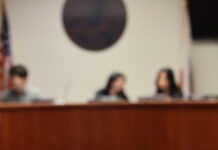 New protest response guidelines have been released at UC Berkeley in the midst of ongoing demonstrations aimed at the state’s disinvestment in higher education. The recently witnessed events, including the pepper-spray incident at UC Davis and the use of police batons at UC Berkeley, have attributed to the efforts of many campuses (UC Riverside included) to develop new measures to address the rights of protesters. Universities face the difficult task of balancing the constitutional rights of students while promoting the security and integrity of the campus community.
New protest response guidelines have been released at UC Berkeley in the midst of ongoing demonstrations aimed at the state’s disinvestment in higher education. The recently witnessed events, including the pepper-spray incident at UC Davis and the use of police batons at UC Berkeley, have attributed to the efforts of many campuses (UC Riverside included) to develop new measures to address the rights of protesters. Universities face the difficult task of balancing the constitutional rights of students while promoting the security and integrity of the campus community.UC Berkeley Executive Vice Chancellor and Provost George Breslauer and Vice Chancellor for Administration and Finance John Wilton co-chaired the protest response team that created the guidelines. Established in early January with a membership of 14 individuals, the response team was tasked with creating an “evolving approach” toward the way in which the university responds to campus protests. The implementation of these guidelines has most recently impacted the university’s response toward the encampment of UC Berkeley’s Sproul Hall and the occupation of the Doe Library.
The guidelines address the timeliness and manner through which the campus will respond to protests while considering the “degree of disruption to campus operations.” Other significant aspects of the guidelines included the ability to develop rapid responses based on the intensity of the protest and not by the basis of the issues being discussed. The guidelines encourage administrators to enact more transparent forms of communication through the presence and deliberation of public officials and faculty members alike. Each protest is examined on a case-to-case basis and the campus response will be influenced by the degree of uncertainty and danger that are apparent in the protest.
Not all are convinced that the newly remodeled guidelines–or guidelines in general–will serve the interests of students. “New guidelines are nothing more than the police state trying to take away our basic freedom of speech. Freedom of speech means freedom of speech,” stated UC Riverside student Christian Murgula in an interview with the Highlander. However, the university chancellors and administrators have expressed enormous dismay over the recent allegations of police brutality and insist that new guidelines would be better for the campus community. “As chancellor…I will do my very best to ensure that this does not happen again. I look forward to working with the Office of the President to identify best practices in this area,” stated UC Berkeley Chancellor Robert Birgeneau in an audio message last year, addressing the police force that was used against UC Berkeley students.
“I can understand that many students are very anxious about this situation. It is my hope that we will try to solve it together because we all are confronting the very same problem—we live in a state that does not value higher education,” said Mary Gauvain, UC Riverside professor of psychology, chair of the Academic Senate and member of Chancellor White’s task force. Gauvain expressed feelings of optimism regarding the task force and hoped that members of the campus community would continue to stay involved; during the UCR task force’s meeting in early January, members of the campus community were in attendance despite the fact that the meeting was intended to be held in private. “The first meeting benefited from having more students present, and I hope that future meetings can move forward from the issues we discussed at that meeting. It is very important that everyone on the campus understand and speak against the state’s continuing disinvestment in higher education,” stated Gauvain.
Last month, the UC Riverside Academic Senate passed a resolution stating, “The right of assembly and expression of views shall not be suppressed. Such assemblies and expressions, however, shall not interfere with the lawful conduct and public safety of others in the University.”
“I expect that we will discuss amendments to the resolution that will further protect free speech and the right to assembly at UCR,” said Patricia Morton, chair and associate professor of architectural history. “[We] need a mutual commitment to reaffirm the right to freedom of speech and assembly at UCR.”








